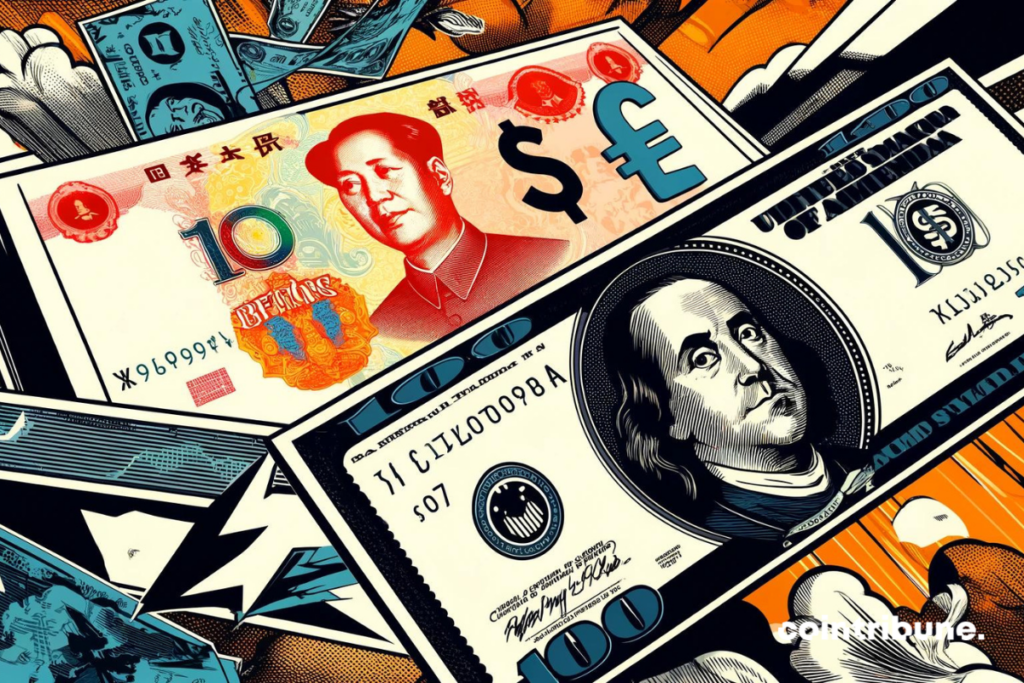🇷🇺🇨🇳 90% of all payments between Russia and China are done in Rubles and Yuan.
— Lord Bebo (@MyLordBebo) May 16, 2024
Previously it was overwhelmingly in Dollar and Euro. pic.twitter.com/cu8ZhhstSB
A
A
BRICS: Will the Chinese yuan put an end to the reign of the dollar?
Sun 19 May 2024 ▪
4
min read ▪ by
Getting informed
▪
Payment
Several countries, including China, are striving to reduce their dependence on the dollar by promoting the use of their own currencies in international transactions. However, despite the ambitious monetary diversification attempts undertaken by this BRICS member, some experts remain skeptical about their success. According to their analyses, the dollar will withstand external pressures and maintain its supremacy over the Chinese currency.

China Tries to Overshadow the American Dollar
China is intensifying its efforts to reduce the dominance of the American dollar in global trade. By encouraging the use of the yuan in international exchanges, particularly through bilateral trade agreements with BRICS member nations like Russia, China seeks to establish its currency as a viable alternative to the dollar. Recently, it conducted $260 billion worth of transactions in yuan with Russia, deliberately excluding the dollar from these exchanges.
This initiative is part of a broader context where BRICS countries are also considering developing a common digital currency, independent of the USD-dominated financial system. This ambitious project aims to create a multipolar financial structure, where the dollar would no longer be the sole global reserve currency.
Meanwhile, the United States faces internal economic challenges that contribute to the deteriorating position of the dollar. Economic indicators such as the increase in national debt and economic uncertainties fuel concerns about the stability and ongoing appeal of the currency as a global reserve currency. This situation could favor the efforts of the BRICS countries, but the dollar remains a currency of choice for many global economies.
Lost Cause for China?
Despite Beijing’s considerable efforts to internationalize its currency, the yuan remains hindered by strict capital control policies and limited international liquidity. These restrictions are partly responsible for the global markets’ reluctance to adopt the yuan on a larger scale.
James Lord, an analyst at Morgan Stanley, warns that without significant liberalization of China’s monetary policy and greater openness of its capital market, the yuan cannot seriously threaten the supremacy of the dollar. Beijing’s strict control measures aim to stabilize the yuan but paradoxically limit its adoption as a global currency.
Moreover, the recent real estate crisis in China and signs of weakness in other economic sectors add a layer of uncertainty regarding the long-term viability of the yuan as a serious competitor to the dollar. Despite China’s ambitions, the economic robustness of the United States and global confidence in the dollar continue to reinforce its status as the preeminent reserve currency. Analysts estimate that the dollar could withstand the turmoil and outpace the currency of this BRICS member.
Maximize your Cointribune experience with our "Read to Earn" program! For every article you read, earn points and access exclusive rewards. Sign up now and start earning benefits.
A
A
Diplômé de Sciences Po Toulouse et titulaire d'une certification consultant blockchain délivrée par Alyra, j'ai rejoint l'aventure Cointribune en 2019. Convaincu du potentiel de la blockchain pour transformer de nombreux secteurs de l'économie, j'ai pris l'engagement de sensibiliser et d'informer le grand public sur cet écosystème en constante évolution. Mon objectif est de permettre à chacun de mieux comprendre la blockchain et de saisir les opportunités qu'elle offre. Je m'efforce chaque jour de fournir une analyse objective de l'actualité, de décrypter les tendances du marché, de relayer les dernières innovations technologiques et de mettre en perspective les enjeux économiques et sociétaux de cette révolution en marche.
DISCLAIMER
The views, thoughts, and opinions expressed in this article belong solely to the author, and should not be taken as investment advice. Do your own research before taking any investment decisions.